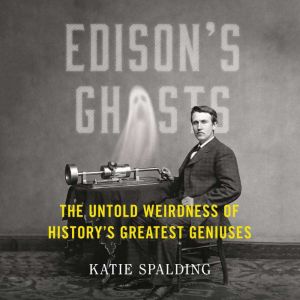

Edison's Ghosts
The Untold Weirdness of History's Greatest Geniuses
Author: Katie Spalding
Narrator: Susie Riddell
Unabridged: 10 hr 53 min
Format: Digital Audiobook Download
Publisher: Little, Brown & Company
Published: 05/16/2023
Categories: Nonfiction, Humor, Technology & Engineering, Inventions, History, Us History, Modern History
Synopsis
Thomas Edison, inventor of the lightbulb, believed that he could communicate with the undead and built the world’s very first hotline to heaven: the Spirit Phone. Marie and Pierre Curie, famous for discovering radioactivity, slept next to a lump of radioactive material for years and strapped it to their arms to watch it burn them in real-time. Lord Byron, acclaimed British poet, literally took a bear with him to university. Isaac Newton discovered the laws of gravity and motion, but he also looked up at the sun without eye protection. The result? Three days of blindness. Tesla, whose scientific work led to the invention of the AC unit, fell in love with a pigeon.
Edison's Ghosts is filled with examples of the so-called best of humanity doing, to put it bluntly, some really dumb shit. You’ll discover stories that deserve to be told but never are: the hilarious, regrettable, and downright bafflingly lesser-known achievements that never made it into our history books, until now.


